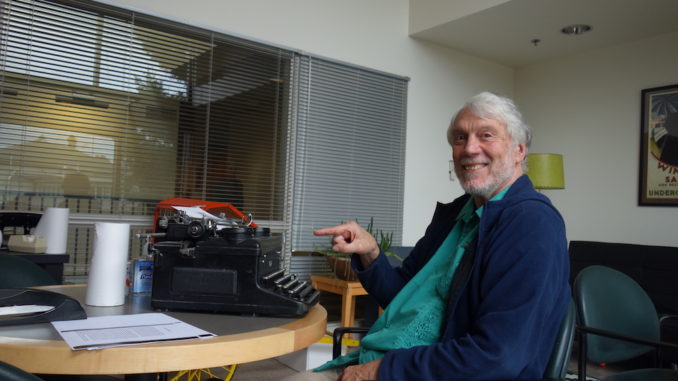
By Ariana Carino
For the past 40 years, Assistant Professor David Galaty has frequented the Maya ruins of Yucatan, Mexico and developed close relations with the region’s inhabitants. His travels in the region have widely expanded his field of study, but a few of his adventures nearly cost him his life.
Galaty was first exposed to Maya culture while on sabbatical in the 1970s.
“I wanted to leave the United States,” said Galaty.
“I was headed to Guatemala, and Guatemala had a terrible Earthquake. They said, ‘please don’t come in. We can’t handle anybody that’s not a medical person.’ So I turned left and ended up in Yucatan. I knew nothing about the Maya … When I first went there I had three words of Spanish.”
During his stay in Yucatan, Galaty realized that the village where he was staying would make a good place for a cultural trip. Galaty began bringing his students from the University of Wisconsin to the Yucatan for study abroad trips. He became increasingly knowledgeable about Maya culture and began studying it in greater detail.
“(The Maya) had the same level of sophistication as, say, Rome,” Galaty said. “They’ve got these big buildings, they’re astronomically oriented, they have a tremendous amount of knowledge and they had a writing system. My field was history of science and I got interested in ancient Mayan science.”
Galaty was teaching at the University of Wisconsin when he first visited Yucatan in 1976. At the end of his first stay in the region, he wanted to return to the area with some of his students.
“Essentially, I built a Yucatan study program that went on until I moved to Portland,” Galaty said. For the next 30 years, he brought his students to Yucatan with him.
Galaty said that his academic trips were largely successful and that his students never had any trouble with their Maya hosts. However, after the semester ended, one of Galaty’s adventures put him in real danger.
After his students had returned to the United States, Galaty stayed behind and had a friend fly him over the jungles of Yucatan, in an effort to locate Maya ruins that were inaccessible on foot.
“At one point, we got lost while we were up in the plane,” Galaty said. The pilot saw an air strip and began descending, with the intention of asking the locals for directions.
As the plane touched down, a platoon of 25 soldiers rushed towards Galaty with their rifles drawn.
“All of the sudden I realized: we’re in Guatemala, and we have no visas or anything,” Galaty said. “We have no reason to be in Guatemala, and they’re … fighting against the Maya guerrillas in this brutal civil war that killed all kinds of people.”
If the soldiers had detained them, Galaty and his friend could have been imprisoned or executed.
“They were trained to try and ferret out foreigner that were helping the Communist insurrection,” Galaty said. “The actual danger would’ve been that they would’ve shot us, cause they were coming out with their rifles.”
Galaty and his friend manage to escape before the soldiers could detain them.
“(The pilot) touched down, we saw the soldiers running towards us, and he just gunned it and went up into the air,” Galaty said. “Then we found the Yacinta river and figured out where we were … We could’ve ended up in a military prison in Guatemala for a long time.”
Not all of Galaty’s cultural misunderstandings have been this life threatening. At one point, he tried to interview a recently released prisoner about his experiences in the penitentiary, but confused the Spanish words for “penitentiary” and “penis.”
Not realizing his mistake, Galaty kept asking the ex-con about his penis, until the man sarcastically asked if Galaty needed a diagram. Not catching the sarcasm, Galaty responded enthusiastically, and a few weeks later the ex-con presented Galaty with a detailed, anatomically correct diagram drawn by his wife.
“That kind of misunderstanding was funny for me, but it’s how wars get started,” Galaty said.
One of Galaty’s most significant experiences in Yucatan took place after a huge hurricane hit the region in 1987. Galaty and students from the University of Wisconsin raised money to help Maya people rebuild their homes.
“I made a promo film, I talked to television people and we raised several thousand dollars,” Galaty said. “The guarantee was that 100 percent of it went to the villages.”
Galaty and his students took the money down to Yucatan and attempted to help the community with reconstruction efforts.
“We bought roofing materials and took them to people who needed them, and then we bought food and made care packages for people who were out of food,” Galaty said. “It turned out that people needed materials, but they had no desire for our help in rebuilding their roofs. It turned out that our students were getting in the way. At one point, I had dropped off a package of food and just started crying because the need was so great and my ability (to help) was so small.”
Galaty is in the midst of finishing a paper about the iconography on an ancient Mayan door in Yucatan. Galaty is not sure when he will return to Yucatan again. However, he still feels at home every time he visits Progreso.
“I feel like it’s a part of me.”
Subscribe to the Mossy Log Newsletter
Stay up to date with the goings-on at Lewis & Clark! Get the top stories or your favorite section delivered to your inbox whenever we release a new issue.

Leave a Reply